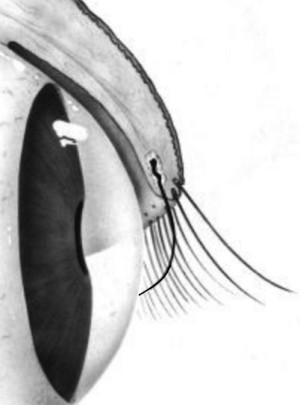|
|
|
 |
Distichiasis is a condition in which
the eyelashes grow from an abnormal position on the edges of the eyelids.
These misplaced lashes can contact the cornea (clear ‘window’ of the front
of the eye), leading to irritation and corneal ulcers, which can impact
vision.
UC Davis
This gene is fairly common in Friesians and crossbred Friesians. Breeding
carries together should be avoided.
Horses that have one copy (carriers) are not affected by the abnormal
gene. However, when a copy of this gene is passed by each parent to the
offspring, it will be affected! If undetected, distichiasis can cause
blindness.
Testing is inexpensive. You may not be able to see the additional lashes,
but horses with excessive tearing or squinting should be examined.
The most common treatment for distichiasis
involves the removal of the abnormal eyelashes under general anesthesia.
Electrolysis or cryotherapy are used to destroy the lash follicle, to
prevent regrowth. Several treatments may be required.
|
|
|
|
Late in December
2020, DNA testing for distichiasis became available to FHH, to test
horses with Friesian lineage. FHH is encouraging testing
to avoid the of breeding two carriers together,
therefore, reducing the number of affected purebred Friesian and part-bred
Friesian horses .
Codes on FHH papers:
Starting in 2018, carrier status codes
will be added to all FHH pedigrees. For horses being registered FHH, a
note advising testing will be added to the registration document, when the
carrier status of the horse(s) with Friesian lineage is not known, or when
there is risk, due to a known or suspected carrier in the pedigree.
Codes printed on FHH
pedigrees are based on current information that was believed to be
accurate at the time of printing, but may be subject to change, as
information is updated daily.
|
Code
|
|
The meaning of
the codes published on our pedigrees |
|
-/-/- |
|
The third negative mark is for
distichiasis. Meaning the horse is negative |
|
ds+ |
|
Horse is a carrier of
distichiasis. Will pass it on the their offspring 50% of the time. |
|
ds++ |
|
Affected by
distichiasis to
some degree and will always pass it on to their offspring. |
|
|
|
|
|
|
|
Below are the
codes for dwarfism and hydrocephalus |
|
-* |
|
Pedigree indicates testing is not
necessary. |
|
-/- |
|
Tested as NOT a carrier for
dwarfism or hydrocephalus. |
|
-/-/- or
3P- |
|
Tested as NOT a carrier for
dwarfism or hydrocephalus or distichiasis. |
|
df+/hy+ |
|
Was tested as a carrier of BOTH
dwarfism and hydrocephalus. |
|
dfhy? |
|
75% Chance of
being a carrier. |
|
df/hy? |
|
Could be a
carrier of dwarfism or hydrocephalus or both. |
|
df+/- |
|
Was tested as a carrier of
dwarfism, but negative for hydrocephalus. |
|
-/hy+ |
|
Was tested as a carrier of
hydrocephalus, but negative for dwarfism. |
|
-*/hy+ |
|
Testing is not necessary for
dwarfism, tested as a carrier of hydrocephalus. |
|
df+/-* |
|
Testing is not necessary for
hydrocephalus, tested as a carrier for dwarfism. |
|
df+* |
|
Likely
carrier of dwarfism, may not be verified by testing.
(e.g. foals
testing positive) |
|
hy+* |
|
Likely carrier of hydrocephalus,
may not be verified by testing.
(e.g. foals
testing positive) |
|
df? |
|
Suspected to be a carrier of
dwarfism. |
|
hy? |
|
Suspected to be a carrier of
hydrocephalus. |
|
Blank |
|
Status is not known.
(e.g. bloodlines
may be too old or horse has not been tested yet) |
|
If
your horse is a carrier of distichiasis:
Being a
carrier does not affect the health of your horse!
●
It is only if you breed this horse, that carrier status matters.
●
If your Friesian or part-bred Friesian is a carrier, they can
still be used for breeding, but to avoid the risk, the status of
all mates with Friesian lineage must be known, before breeding.
●
If you breed
to any horse with Friesian lineage, you will want to have DNA test
PROOF that the partner horse is NOT a carrier also. Be careful
of false testing reports. Ask to see the report or call the
registry.
●
If you breed
to another carrier parent, the foal has a 1 in 4 (25%) chance of
being affected.
●
Keep in mind
that any carrier parent will pass on the genetic mutation
to approximately 50% their foals, even if the other
parent is clear or regardless of the breed. So, if you plan to breed
offspring from carriers back to Friesian lines, they should tested
first.
If you have
any questions, please call our office at 877-653-1341.
|
|
Sorry, we do not know the origin of the
photos.
These photos are being used for
educational purposes only.
|
|
|

